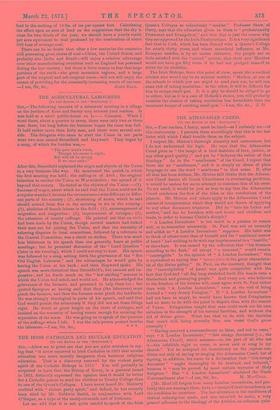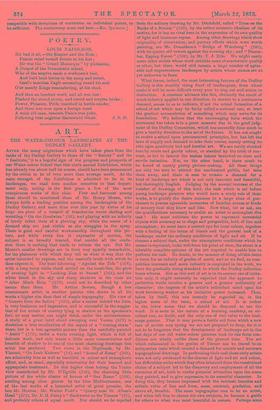THE ATHANASIAN CREED.
[To THE EDITOR OF THE"SPECTATOR:'] SIR,—Your readers, I fancy, must be tired—as I certainly am—of this controversy ; I promise them accordingly that this is the last letter with which I shall trouble them on the subject.
I respect Mr. Minton's thorough sincerity and earnestness, but I do not understand his logic. He says that the Athanasian Creed gives us " the image of a God destitute of love, justice, or any other good quality ;" and yet he " believes the entire of that theology." As to the " anathemas " of the Creed, I repeat that there are no "anathemas," and it is simply an abuse of plain language to use the word " anathema" in that sense. If, after all that has been written, Mr. Minton still thinks that the Athena- sian Creed damns all Greek Churchmen to everlasting perdition, it would be useless for me to attempt to convince him of his error. To my mind, it would be just as true to say that the Athanasian Creed condemns the flow of the tides or the revolutions of the planets. Mr. Minton and others apply to the Athanasian Creed canons of interpretation which they would not dream of applying to any other document whatever. Did he " hate his father and mother," and has he forsaken wife and house and children and lands, in order to become Christ's disciple ?
" A London Incumbent" is too much in a passion to reason well, or to remember accurately. St. Paul was not so unmanly and selfish as "A London Incumbent" supposes. His habit was to think of others more than of himself, and his " continual sorrow of heart" had nothing to do with any imprisonment in a " bastille," or elsewhere. It was caused by the reflection that " his kinsmen according to the flesh," all except " a remnant," would remain " incorrigible." In the opinion of " A London Incumbent," this is equivalent to saying that " laissez-faire is the great characteris- tic of the divine policy." St. Paul, on the contrary, thought that the " incorrigibility " of Israel was quite compatible with the fact that God had "all day long stretched forth His hands unto a disobedient and gainsaying people." And every one who believes in the freedom of the human will, must agree with St. Paul rather than with "A. London Incumbent," even at the risk of being dubbed a " very dreary Pelagian." If " A London Incumbent " had not been so angry, he would have known that Pelagianism had no more to do with the point in dispute than with the transit of Venus. Pelagianism taught that man could work out his own salvation in the strength of his natural faculties, and without the aid of divine grace. What has that to do with the doctrine that man's will, being eternally free, can resist God's grace eternally ?
" Having received a commandment to bless, and not to curse," says " A London Incumbent," " this savage document [i.e., the Athanasian Creed], which assumes—on the part of all who use it—the infallible right to curse, is never said or sung in my church." Yet he accepted his incumbency on the express con- dition not only of saying or singing the Athanasian Creed, but of signing, in addition, his name to a declaration that "this savage document " " ought thoroughly to be received and believed," because it " may be proved by most certain warrants of Holy Scripture." Has "A London Incumbent" abolished the Ninth Commandment also ?—I am, Sir, &c., M. MacCoix.
[Mr. MacColl forgets that many London incumbents, and pro- bably this one amongst them, have not accepted their incumbency on the condition he mentions. The last alteration in the conditions of clerical subscription made, and was intended to make, a very general adhesion to the theology of the Articles, an adhesion quite
compatible with deviations of conviction on individual points, to be sufficient. The controversy must end here.—En. Spectator.]



































 Previous page
Previous page